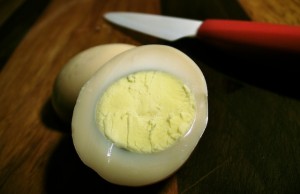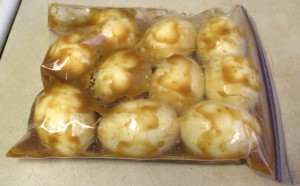Miso Eggs
 I first read about Miso Tamago on the Just Bento blog by Makiko Itoh. Miso, aside from making a delicious soup, is also traditionally used to pickle vegetables like daikon radish or eggplant. I am hesitant to say it, but in this case we are “pickling” hard-boiled eggs.
I first read about Miso Tamago on the Just Bento blog by Makiko Itoh. Miso, aside from making a delicious soup, is also traditionally used to pickle vegetables like daikon radish or eggplant. I am hesitant to say it, but in this case we are “pickling” hard-boiled eggs.
I hesitate because the image most Americans have when you mention “pickled eggs” is a jar that’s been sitting on a bartop for an indeterminate period of time, with a liquid of red or greenish hue, filled with the oblong orbs floating ominously in it.
The only relation this recipe has with that image, is an egg is involved. So check your prejudice at the door.
After learning this very simple recipe. Miso eggs have become a staple in our house. Be it for a quick snack, breakfast in a hurry, or some protein added to a lunch, these eggs are a delicious commodity.
My version of this recipe is a little different than that of Makiko. Since I am storing all of the eggs together, rather than individually wrapped, I have increased the liquid element. Also, since we have some great local mesquite honey, I am using honey rather than maple syrup, but feel free to try either and see how each suits your tastes.
 A quart mason jar large enough to store about 10 miso eggs in the fridge, but actually I found that the best way to ensure an even coating and flavor profile was to use a 1-quart zip-top bag. Every day I would move the bag to make sure no surface sat uncoated. Some water will be drawn out of the eggs, increasing the liquid, which helps keeping everything coated. This brings more flavor into the eggs, but keep in mind that as the salt draws moisture out, the egg is becoming “drier”, and at the end of a week you might find the yolks are a little dry.
A quart mason jar large enough to store about 10 miso eggs in the fridge, but actually I found that the best way to ensure an even coating and flavor profile was to use a 1-quart zip-top bag. Every day I would move the bag to make sure no surface sat uncoated. Some water will be drawn out of the eggs, increasing the liquid, which helps keeping everything coated. This brings more flavor into the eggs, but keep in mind that as the salt draws moisture out, the egg is becoming “drier”, and at the end of a week you might find the yolks are a little dry.
Recipe: Miso Eggs
- 8-12 hard-boiled eggs (shelled)
- 3 Tbsp miso (I prefer Red Miso)
- 3 Tbsp honey
- Mix miso and honey together.
- Coat eggs with mixture, and store in the refrigerator.
- Wait 48 hrs if you can. I find that the flavor reaches the yolk around day 3, and the should keep for about 10 days.
The Basic Breakdown:
We get “cage-free” eggs at Costco, for about $3.60/18eggs, which is $0.20/egg. A 26oz container of miso, is about $4, which comes to about $0.23/recipe. We can get Mesquite honey here at $6.50 for 3 lbs, which comes to $0.20/recipe.
If we spread that cost of Miso and Honey across a full dozen eggs, we are looking at a cost per miso egg at $0.235. Less than a quarter per egg!
Calorie-wise, the average extra-large egg is 70 calories, the total calories in the miso is 35, and from the honey is 180. Keep in mind you are not drinking the liquid, and I typically rinse off the eggs before eating, so the calorie addition to the egg itself is minimal, which is why I estimate a single miso egg has about 75 calories.
Leave a Reply